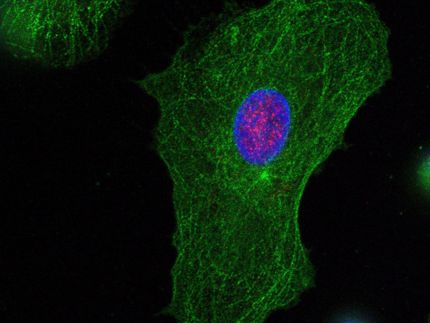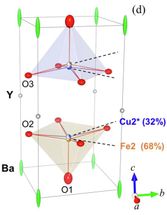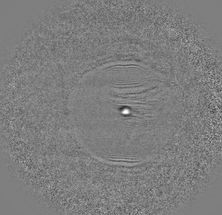A precise measure of protective immunity
New tool aims to make HCV vaccine search easier
Around 71 million people worldwide are infected with the hepatitis C virus (HCV). One reason why no vaccine against the virus has been found to date is that there are numerous virus variants, some of which differ by more than 30% from each other. Scientists from TWINCORE, the Hannover Medical School (MHH) and the Helmholtz Centre for Infection Research (HZI) in Braunschweig have now succeeded in developing a test system that precisely measures the protective effect of an immune response against the large spectrum of HCV pathogens.
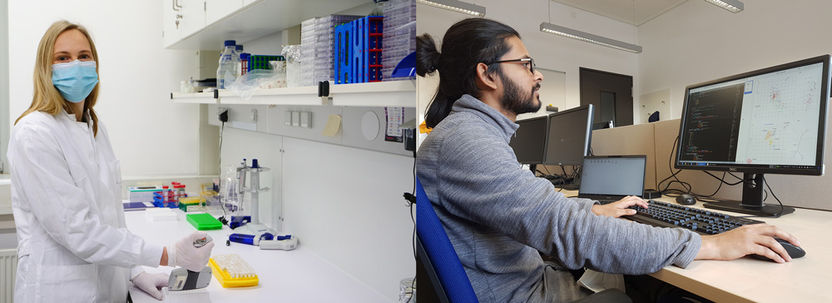
Dr Dorothea Bankwitz (l.), first author of the study, carried out the work in the laboratory. The data obtained was analysed by Akash Bahai (r.) using bioinformatics.
© TWINCORE / Grabowsk
To develop such a benchmark, the researchers at TWINCORE first examined so-called neutralising antibodies from the blood of 104 HCV-positive patients. These endogenous defence molecules play a central role in the immune response. They are produced both during an infection with a pathogen and after a vaccination. They bind viruses and disable them. The researchers were initially interested in how well the antibodies can neutralise as many different HC viruses as possible.
"This is a central question for vaccine development. You don't know beforehand which virus you will be dealing with," says Dr Dorothea Bankwitz, scientist at the Institute for Experimental Virology at TWINCORE and first author of the study. "A vaccine therefore has to build up immunity that protects against infection with very many different variants."
Based on these findings, they used bioinformatics methods to divide the viruses into six different groups, known as clusters. "There is no obvious genetic connection between the viruses in the same neutralisation clusters as we know it from the virus strains. However, they behave very similarly in terms of their susceptibility to antibodies," says Prof. Alice McHardy, head of the "Bioinformatics of Infection Research" group at the HZI.
In the further course of the study, the researchers show that painstakingly analysing the effect of antibodies against all test viruses is not necessary. "It is sufficient to use a test virus from each of the clusters as an example to measure how well the antibodies protect against different HCV variants," says Akash Bahai, bioinformatician in McHardy's team. This is a major improvement and a very effective method for assessing the potency of vaccine candidates in the future.
However, this discovery also has another special relevance for vaccine development: "Until now, it was assumed that one had to vaccinate with genetically very different HCV variants in order to build up broad protection. Now we have learned that the variants react differently to antibodies, regardless of their genetic background," says Prof. Thomas Pietschmann, Director of the Institute for Experimental Virology at TWINCORE and head of the research project. "It is probably better to immunise against representatives of the virus clusters in order to build up a broadly protective immune response. The clusters we have found can now form a basis for this." The researchers therefore hope that the test system they have created will help in the further search for a vaccine against HCV.
A large part of this research project was not carried out in the laboratory, but on the computer. "That's the norm these days," says Pietschmann. "Therefore, we are very happy that we are perfectly networked with bioinformaticians. The RESIST Cluster of Excellence, in which researchers from TWINCORE, the MHH and the HZI are involved, and the German Centre for Infection Research (DZIF) offer us the optimal conditions for this."
Original publication
Dorothea Bankwitz, Akash Bahai, Maurice Labuhn, Mandy Doepke, Corinne Ginkel, Tanvi Khera, Daniel Todt, Luisa J Ströh, Leona Dold, Florian Klein, Frank Klawonn, Thomas Krey, Patrick Behrendt, Markus Cornberg , Alice C McHardy, Thomas Pietschmann; "Hepatitis C reference viruses highlight potent antibody responses and diverse viral functional interactions with neutralising antibodies"; Gut; 2020
Most read news
Original publication
Dorothea Bankwitz, Akash Bahai, Maurice Labuhn, Mandy Doepke, Corinne Ginkel, Tanvi Khera, Daniel Todt, Luisa J Ströh, Leona Dold, Florian Klein, Frank Klawonn, Thomas Krey, Patrick Behrendt, Markus Cornberg , Alice C McHardy, Thomas Pietschmann; "Hepatitis C reference viruses highlight potent antibody responses and diverse viral functional interactions with neutralising antibodies"; Gut; 2020
Organizations
Other news from the department science
These products might interest you
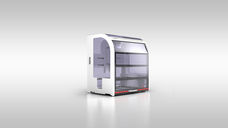
CyBio FeliX by Analytik Jena
Automation of Cellular Assays
Flexible Pipetting Platform for Fully Automated Single to Multichannel Liquid Handling
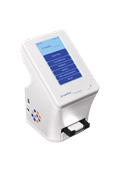
RapidScan ST5-W Lateral Flow Assay Reader by Gold Standard Diagnostics Corp
LFD Assay Reader Validated for Multiple Food and Environmental Rapid Tests
Obtain quick and reliable results with an accurate, easy to use and highly flexible imaging platform

Get the analytics and lab tech industry in your inbox
By submitting this form you agree that LUMITOS AG will send you the newsletter(s) selected above by email. Your data will not be passed on to third parties. Your data will be stored and processed in accordance with our data protection regulations. LUMITOS may contact you by email for the purpose of advertising or market and opinion surveys. You can revoke your consent at any time without giving reasons to LUMITOS AG, Ernst-Augustin-Str. 2, 12489 Berlin, Germany or by e-mail at revoke@lumitos.com with effect for the future. In addition, each email contains a link to unsubscribe from the corresponding newsletter.
